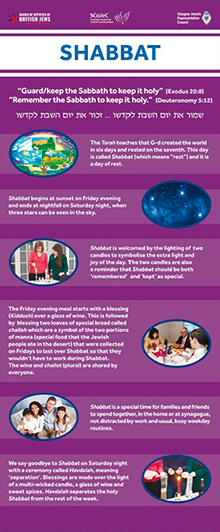|
|
Judaism and the Jewish Community
Daily Life:
Shabbat |
| |
|
| |
|
| |
| |
|
Additional Information |
● |
The Torah gives instructions about Shabbat in two places: |

|
“And G-d blessed the seventh day and declared it holy, having ceased from all the work of creation that G-d had done.” (Genesis 2) |

|
“Six days you shall work, but on the seventh day you shall rest; in ploughing time and in harvest time you shall rest.” (Exodus 34) |
● |
Shabbat starts on Friday evening and ends on Saturday night, because the Torah describes creation in that order: “and there was evening and there was morning” (Genesis 1) |
● |
Shabbat (and festivals) last for approximately 25 hours because we are not sure exactly when the evening starts – at sundown or when it is fully dark. The rabbis therefore erred on the side of caution, and included twilight at both ends, so that Shabbat and festivals start at sundown but finish when it is fully dark – more than 24 hours. |
● |
Different Jewish communities interpret ‘rest’ in different ways. Orthodox Judaism defines ‘rest’ to mean refraining from the 39 kinds of creative activities listed in the oral law. Masorti Judaism is also guided by these rules, while Reform and Liberal Judaism allow individuals much more flexibility in defining for themselves how they prefer to make Shabbat restful. What all groups will agree on is that Shabbat is a time for family, friends, reflecting on the week and good food! |
● |
On Friday evening (and at the start of festivals) two candles are lit to represent the two slightly different versions of the fourth of the Ten Commandments in the Torah: to observe(or guard) Shabbat, and to remember Shabbat, and the meal begins with kiddush, recited over a glass of wine (or grape juice) to give thanks for Shabbat, and two challot to represent the double portion of food the Jewish people received each week before Shabbat after they left Egypt. |
● |
In some families, parents bless their children on Friday nights with an ancient biblical blessing that G-d should protect them and bring them peace. |
|
| |

|
|
● |
During the Synagogue service on Shabbat mornings, the Torah is taken out from the Ark and read in public followed by a related reading called the Haftorah from a related book of the Prophets. |
● |
At the end of Shabbat, Havdalah (meaning “separation”) is recited over a glass of wine (or grape juice), herbs or spices, and a candle, to mark the end of the day of rest and pray for a good working week ahead. |
|
| |
Suggested discussion questions and activities |
● |
Why do you think two slightly different versions of the commandment to keep Shabbat were included in the Torah? What do you think is the difference between ‘guarding’ and ‘remembering’ Shabbat? |
● |
Can you think of the benefits of spending a whole day a week without using a phone, laptop, TV, or computer game? |
● |
Why do you think there is so much focus on food in the culture and ritual of many religions? |
● |
Hold a debate on whether shops should be allowed to open 7 days a week. Think of the pros and cons of everyone having a day a week without shopping. |
● |
Plait and bake challah. |
● |
Make a kit for the Havdalah ceremony. |
|
| |
Additional Resources |
|
| |
| |
| |
|
|
|